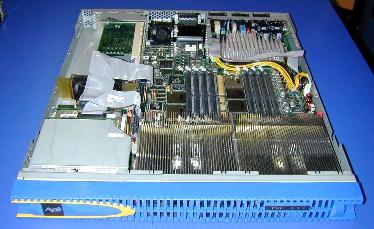![[LWN Logo]](/images/lc.png)
![[LWN Feature]](/images/Feature.png)
![[LWN Logo]](/images/lc.png) |
|
![[LWN Feature]](/images/Feature.png) |
|
Weekly Edition Daily updates Events Calendar Book reviews Penguin Gallery |
LWN Comdex 2000 - Tuesday and Wednesday coverage
Tuesday Nov. 14Linux Greenhouse LWN talked to Leslie Proctor, Chris Koenigsaecker and Harold Koenigsaecker about the Linux Greenhouse project (LGH). The LGH is the brainchild of Leslie Proctor and Tim Ney, a Free Software Foundation founding member. The purpose of LGH is to act as a catalyst organization that brings together ideas, money, and programming talent in order to start new companies that are based on open source software. Typically, many technical people don't have the expertise to bring about a working business, and LGH can help fill this need. LGH has provided classes in various countries and assembled 15 projects in the past year. There are now 24 projects in the works. The project brings angel investors together with idea people and programmers and also provides marketing and advertising assistance. For those not familiar with the term, angel investors provide early start-up money to companies and cash out when the second round of financing comes in from Venture Capitalists. Current projects include putting Linux on handheld devices, a web design system, and a Linux education course for continuing education students. People with good ideas, investment capital and/or programming skills should all check out the Linux Greenhouse. On a similar note, if you have a great idea, but no time and would like to see it developed in an open source manner, check out Eric Hansen's ShouldExist page. LWN ran into Eric while we were at the Linux Greenhouse booth. LPI The folks at the Linux Professional Institute (LPI) booth said that LPI has just released a Japanese language version of its 101 edition course. More courses are being translated. LPI is a vendor-neutral organization who's purpose is to design and deliver a standard Linux certification program.
iRobot The iRobot is an embedded Linux system on wheels who's purpose is to provide the operator with a "remote presence". The robot is tied back to the controlling computer via a 2.4 Ghz wireless network interface. The iRobot can be moved around with a web interface on the remote side and features a remote controlled camera that sits in the head and can be pointed in various directions. In addition to the web control interface, there is a hand-held IR remote control that allows the operator to walk with the robot. The mechanics of the robot feature an eight wheeled base with an articulating front axle that allows it to climb stairs. The head of the iRobot moves up and down which allows it to see from different heights. There is a built in sonar device on the top of the iRobot's head that has a spinning directional acoustic aperture which gives the robot a real sci-fi appearance. One would almost expect it to move around saying "Danger Will Robinson", but it lacks the requisite flailing arms. The sonar is used to give the iRobot positional information which keeps it from running into objects as it moves about. Although the sonar is imperceptible to humans, your pets may not like it. Besides having a major amount of fun-factor, the iRobot has some practical uses. It is possible to connect to the iRobot from a remote site and steer the device around a building, this is useful for checking in on pets or children. Such a device could be beneficial for hazardous duty services. A remote controlled squirt gun would be a welcome addition for keeping the cat away from the couch during those late nights at the office.
API Networks, Inc
API Networks, Inc was showing off its new high performance 833 Mhz dual Alpha processor rack mount system, the CS20. The box fits into a a 1U format rack space and runs very cool, making it a good choice for densely packed racks. The normal DEC boot monitor ROM has been replaced with a bootable Linux kernel, so the box can be used as a compute engine without the requirement of a hard drive. There is plenty of capability for fast networking with dual 10/100 Ethernet controllers on board and two single slot high speed PCI buses for faster network cards. All of this makes the box an ideal candidate for building powerful Beowulf clusters.
Wednesday Nov. 15Kaspersky Lab One Comdex press announcement that caught the eye of LWN was from Kaspersky Labs, a Russian company who is advertising Linux anti-virus software. Viruses aren't typcially a problem that you hear about on Linux, so we had to check this company out. We talked to Denis Zenkin, Kapersky's head of corporate communication who shed some light on the situation. Kapersky is selling software that works with Linux mail programs to prevent Windows viruses from being passed onto vulnerable hosts via an email gateway host. Kaspersky's software works with the sendmail and qmail mail daemons on Linux, Free BSD, and BSDI. The Postfix mail daemon is not currently supported. Kaspersky's products consist of a command line anti-virus scanner, a Linux only virus monitor program, and an anti-virus daemon. Dr. Zenkin did mention that there were some attempts underway by virus makers to create Linux viruses, but to date, they have not been very successful in their attempts. Linux viruses typically enter a system through a boot floppy or installation or via installation of an infected binary.
Kaspersky Labs was established
in 1997 and its corporate headquarters are in Moscow.
They employ over one hundred people and have representatives in the
UK, South Africa, and Walnut Creek, California.
|
![]()
![]() Copyright 2002
Eklektix, Inc. all rights
reserved.
Copyright 2002
Eklektix, Inc. all rights
reserved.
Linux ® is a registered trademark of Linus Torvalds